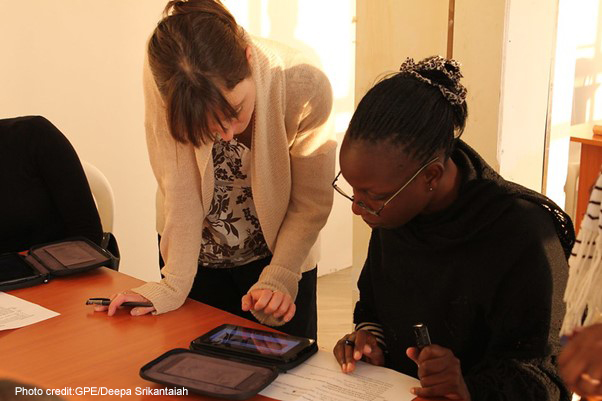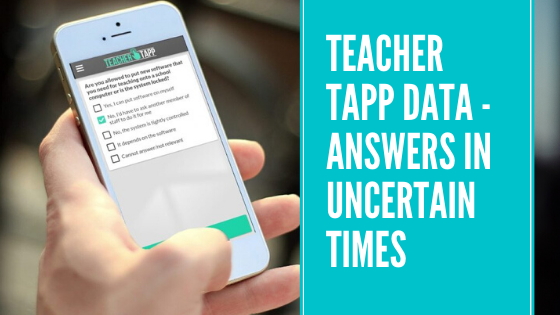This blog was written by Johanna Bohorquez Martinez, Masters student placement at NFER, and Katarzyna Kubaka, NFER Head of International Development. It was originally published on the NFER website on 23 September 2024.
The field of educational technology (EdTech) is dynamic and continually evolving, with new technologies and tools emerging regularly. One particular area of growth has been the incorporation of EdTech into teacher continuous professional development (CPD) activities. By incorporating advanced technologies into professional development programmes, educators can receive relevant, timely, personalised assistance, ultimately increasing their teaching effectiveness, and contributing to better student outcomes. For example, innovations like AI-powered chatbots, such as ChatGPT, have the potential to revolutionise teacher professional development by providing personalised support and guidance to educators. However, simply incorporating technology does not automatically ensure effectiveness and quality for all. This blog offers advice on how to maximise the potential of technology in CPD initiatives in promoting equity, enhancing digital literacy, addressing contextual needs, and facilitating collaboration among teachers.[i]
Technology can support teachers’ engagement
Technology-led CPD can impact teachers’ professional roles by improving motivation and empowerment. When teachers participate in these initiatives, they feel recognised and valued, which boosts their motivation. It also provides new perspectives and ways of thinking, enhancing their sense of professional competence. An example being the OER4Schools project, funded by the Centre for Commonwealth Education, a Zambian initiative, later extended to other countries, promoting learning-centred education and interactive pedagogies in ICT-equipped elementary schools. It supported professional development with digital resources and involved local teachers in the design and co-creation of pedagogical and teaching materials, allowing for tailored CPD and pedagogical interventions. Teachers reported that the opportunity for critical reflection on classroom challenges and the guarantee that CPD content accurately represents the realities of working contexts, had helped them address real-world issues more effectively, leading to more meaningful professional growth and improved teaching practices.
CPD programmes can increase accessibility by combining different levels of technology
By promoting the use of not only the latest technologies but also more accessible (e.g. offline) tools, initiatives can ensure equal access for all educators, especially those from populations at risk of exclusion. This flexibility can enable more inclusive and equitable CPD initiatives, ensuring that even the most vulnerable educators can benefit from professional development opportunities. For instance, a flexible school-based professional development program in Kenya was created to help teachers develop more participatory approaches to learning and teaching with the use of Open Educational Resources (OER). The results indicate that teachers used a wider range of approaches, resulting in more active student involvement and improved assessment scores. The flexibility of school-based professional development and the varied access to professional development and teaching materials, alongside mentoring, peer support, and adaptable resources, significantly improved teaching quality.
Tailoring programmes to teachers’ digital skills improves engagement in CPD
Aligning teachers’ needs with digital literacy is crucial for effective professional development initiatives. By understanding regional needs and providing specialised materials, mentorship, and advice leaders can address individual teacher requirements and regional challenges. However, disparities in teacher involvement and access to technology can exacerbate inequalities in professional development outcomes. To maximise effectiveness, leaders must tailor programmes to local contexts and address inequity around internet access and advanced technologies. It is critical to consider each population’s unique needs and challenges in order to maximise the impact of technology-mediated development and promote educational equity. This requires careful planning, extensive support structures, and intentional efforts to promote equity and inclusion.
Technology can foster teacher collaboration
Technology can facilitate the exchange of ideas, resources, and best practices. However, poorly executed projects can unintentionally isolate teachers or communities of educators, leading to limited engagement and effectiveness. Therefore, CPD initiatives need to purposely encourage meaningful collaboration and promote a sense of community among teachers. Even simple resources, such as text messages, can help teachers collaborate with each other. For instance, an integrated in-service teacher training (INSET) program in Sierra Leone implemented a multi-channel approach to mitigate internet access challenges and to expand learning opportunities. The approach included mobile versions of the platforms, offline access to resources, an e-portfolio for teachers to share their learnings, and WhatsApp groups. Participants preferred WhatsApp as their main communication channel because it facilitated interaction among teacher most effectively.
Incorporating technology into CPD initiatives has the potential to improve educational practices and outcomes. However, technology is only part of the answer and will not change CPD simply by being part of teachers’ education programmes. The true effectiveness of these initiatives depends on teachers’ ability to engage with EdTech, their active participation and a thorough understanding of their knowledge, experiences, and needs. As CPD evolves and integrates advanced technologies into education, CPD designers must prioritise teacher collaboration and inclusion in order to truly transform professional development and, ultimately, student outcomes.
[i] The recommendations are based on the findings from the master’s dissertation titled Technology-mediated Teachers’ Continuous Professional Development (CPD) in Sub-Saharan Africa, presented by Johanna Bohorquez-Martinez for the Master of Science in Comparative Education and International Development at the University of Edinburgh in 2023.





